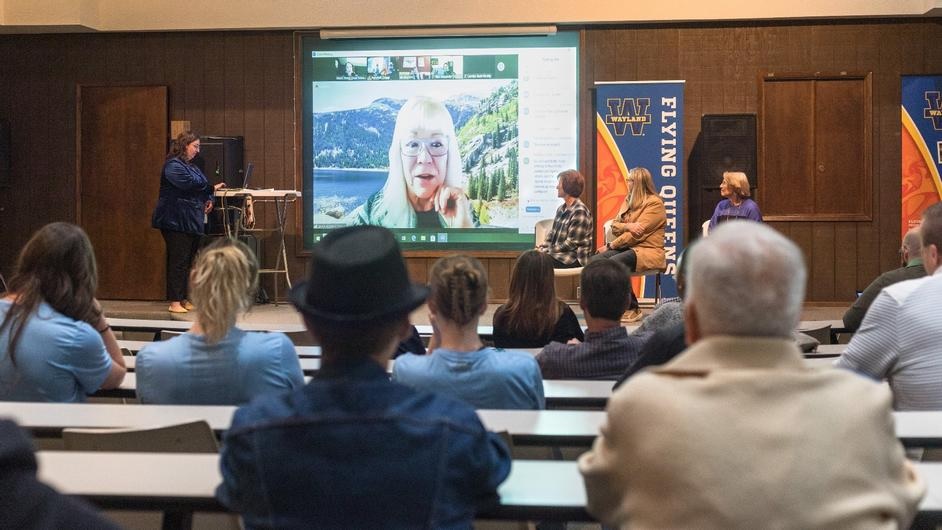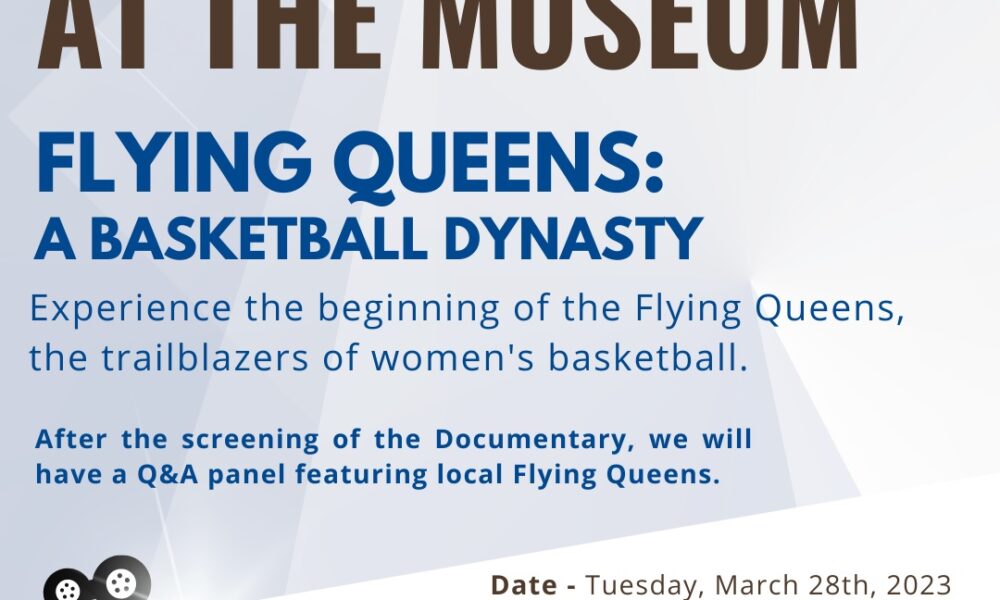
A group of former Flying Queens recently went one-on-one with current players and the community as they teamed up to offer remembrances and advice during a panel discussion.
Following a screening of the documentary Flying Queens: A Basketball Dynasty, former Flying Queens Rita Alexander Colman, Alice “Cookie” Barron, Valerie “Val” Goodwin-Colbert, Cherri Rapp, Darla Armes Ford and Sharla Harrison Rich shared their thoughts during the event sponsored by Wayland’s History Department, Mabee Regional Heritage Center, and the Hutcherson Flying Queens Foundation. Their comments took on a personal tone when a current Flying Queen asked for advice.
“The first thing is you have to work really hard,” said Rapp, who played from 1968 to 1972. “You hustle, hustle, hustle as hard as you can. The second thing is to use your head, and the third thing is to listen to your coach. Everyone has a coach, even the Olympians. Listen to your coach because he’s got the best plan. Be a team player, work together and help each other.”
“You’re going to experience tough times, and sometimes you will want to quit, but when you don’t, that will stick with you,” said Ford, who played from 1980 to 1984. “If you start quitting, it is easy to quit. Having a coach that won’t let you quit will stick with you a long time. Enjoy every moment because it is going to fly by.”
“Throw your heart over the bar and your body will follow,” said Goodwin-Colbert, who was a Flying Queen from 1975 to 1979 and a decorated high jumper. “Stay focused. You are going to make mistakes in life. Work through those, rebound and go forward with good intentions.”
When asked about how they were introduced to the Flying Queens, Barron made her shot before passing off to Colman and Rich.
“I was at a summer revival,” said Barron, who played from 1954 to 1957 during the team’s record-setting 131-game winning streak. “Two Baptist ministers were holding the revival and they talked about this great team. One of the people in the congregation said, ‘You should have Cookie Barron there.’ It took me a year to get there because I could not afford to drive there and try out, but at the national AAU Tournament, Harley (Redin) saw me play and asked me to come try out.”
Colman, who was a Flying Queen from 1953 to 1957 and never lost a game during her four years at Wayland, recalled the day Coach Redin climbed into the bleachers in the gym where she was practicing and “watched me shoot basketballs for about 35 minutes.”
“After a few days, my coach came and said, ‘That man that was here told me all about this basketball team at Wayland College in Plainview, Texas.’ He said, ‘Would you be interested in something like that?’ My eyes went through my head. I said, ‘Of course.’ All I ever thought about was going to school and playing basketball. That was my two goals. I had the great honor to play at Wayland for four years. Great gals. Great coaches. Great friends.”
“I’m one of the few Queens whose mother played,” Rich said of her introduction to the tradition-rich team. Rich played from 1985 to 1989 and still holds the all-time scoring record. “My mom was a Flying Queen from ’59 to ’63. I grew up knowing about the Flying Queens, but my mom didn’t tell me what a famous Queen she was. She was a three-time All-American, has a gold medal from the Pan American Games in Brazil, and was on the international team that played in Russia.”
The event was designed to be the centerpiece of Wayland’s Women’s History Month celebration and to reflect on the 50th anniversary of Title IX. Dr. Rebekah Crowe, Professor of History, served as moderator and asked about the effects of equality legislation on women’s sports.
“In 1972 when Title IV became a federal law, I didn’t even know about that,” Goodwin-Colbert said. “When you get to Wayland you are playing in front of full gym crowds and it’s incredible. The big universities were not giving any kind of scholarships to women at my time. We were on scholarship, and we were treated like a lady and like really great athletes. There was not a distinction until I got out of college and went into pro ball. When you got into coaching, you saw the disparities. I coached for over 35 years, and I saw a lot of things that were quite different. It wasn’t until after Wayland days that I saw the disparities and gender inequity.”
“When we came to Wayland, we were given everything in the world we wanted — full scholarships and flying everywhere,” Ford said. “We didn’t lack for anything, but it was different for the boys who played. I’m very blessed that I didn’t even know about Title IX until my junior year.”
“I got that scholarship to Wayland, and we were treated wonderfully. Then, I got into the real world,” Barron said. “I found out Colorado had absolutely no sports for girls. It was pre-Title IX and my very first job was in administration in physical education. I never felt discriminated against until it came to budget time to get athletics started for girls. I had the privileges and I wanted them to have the same privileges I had experienced.”
Rapp echoed the thoughts of the Flying Queens on the panel when she said, “What made my life what it is today was coming here to Wayland. I was just happy to make the team. I learned not to quit. I made that United States team, go down there to South America, and here I am playing with all of these All-Americans. I realized all of these people are just like me. I learned I was like everyone else. I learned you don’t have to be a great athlete to be a star. You have to be coachable, and you have to work really hard.”
Then Rapp offered another piece of advice.
“You have to be smart and not get your third foul because, if the referee makes a mistake, it’s going to be your fourth foul and you are going to the bench,” she said. “You have to figure things out. You learn a lot of things. It changed my life and made me a better person.”
Wayland’s History Department has launched an oral history project on the Flying Queens program, Crowe said. A video of the panel discussion will be available after it is edited and closed captioning is added.
source: WBU Marketing & Communications

